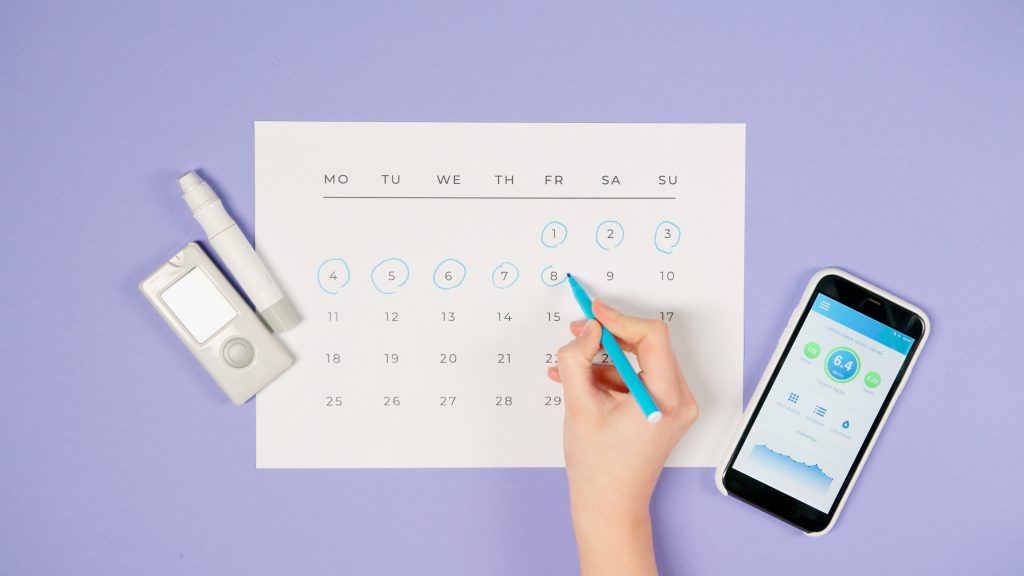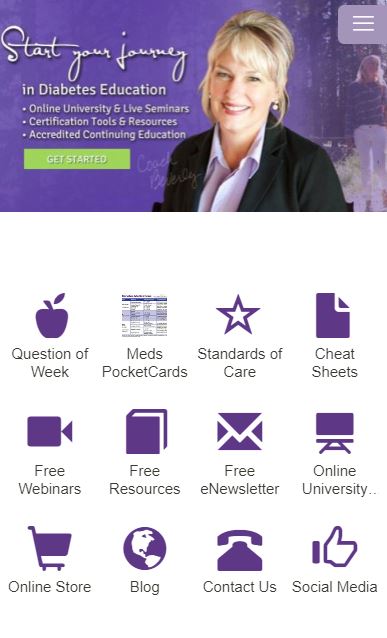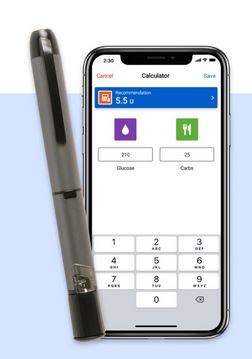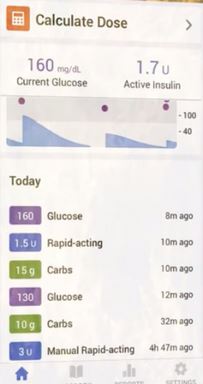New Treatment for Type 1 Diabetes | VX-880
Vertex Pharmaceuticals just announced preliminary results from a trial that explores a new intervention to treat type 1 diabetes. The early results are very promising.
The first person with type 1 diabetes to receive this new stem-cell derived experimental therapy, had an 91% drop in their insulin needs. The person has lived with type 1 for over 40 years. After the intervention, they not only experienced a reduction in their insulin needs, their fasting C-peptide levels went from undetectable to 280. This dramatic C-peptide increase is a clinical indicator of stem-cell therapy success and endogenous insulin secretion.
These results are exciting and offer hope for a potential new treatment approach for type 1 diabetes.
VX-880 is a stem cell derived therapy that replaces damaged beta cells with healthy transplanted insulin producing cells in clinical trials. However, these new cells are at risk for attack by the body’s immune system, so immunosuppression therapy is currently required for stem-cell transplant success.
The future goal is to create a version of this treatment that doesn’t require immunosuppressive therapy. And Vertex, the makers of VX-880 are working on creating an encapsulated islet cell program that doesn’t initiate an autoimmune attack.
For more information and clinical trials, click this link.
Resources for People Living with Type 1 Diabetes

Below is a list of helpful online resources for Type 1 Diabetes. They include sites for national organizations like the American Diabetes Association (ADA), sites for diabetes interest groups, and other participant organizations that provide helpful diabetes tips and opportunities to join online groups. Click here for a Type 1 Resource Handout to share with colleagues and people living with type 1 diabetes.
Click the links below to visit the website:
- Let’s fight Type 1 Together | American Diabetes Association (ADA)
- Mental Health Resources Directory | ADA
- Type 1 Diabetes Resources and Support | Juvenile Diabetes Research Foundation: Explore our informational guides or make a personal connection with someone experienced with type 1 diabetes (T1D). The JDRF community has you covered.
- Empowering Youth with Type 1 Diabetes |The Chris Dudley Foundation
- The National Institutes of Health Diabetes Resources | CDC
- The College Diabetes Network: Focuses Specifically on Young Adults with Diabetes | College Diabetes Network
- The Diabulimia Helpline: for Individuals Having Eating Problems
- Beyond Type 1 Diabetes
- Connected in Motion: Peer-Based Sports & Outdoor Adventures for those with Type 1 (in U.S. and Canada) | Connected In Motion
- Diatribe: Library of Online Resources, Blog & Community Forums
- Diabetes Education: At times it might seem overwhelming, but you can thrive with diabetes, and a Diabetes Care and Education Specialist can help. Includes a link to find a diabetes program near you.
Sign up for Diabetes Blog Bytes – we post one daily Blog Byte from Monday to Friday. And of course, Tuesday is our Question of the Week. It’s Informative and FREE! Sign up below!
[yikes-mailchimp form=”1″]Cheat Sheets Now on CDCES Coach App | Free Resource Friday
Our new Diabetes Cheat Sheets are available on our CDCES Coach app!

We know how helpful these resources are for busy diabetes educations specialists so we wanted to make accessing them even easier!
If you don’t have it already, you can download our free CDCES Coach app and view or print the Cheat Sheets directly from the app.
These sheets and cards include information to study for certification exams and to use in your clinical setting. Plus, we have included teaching sheets for people with diabetes.
Studying for the CDCES Exam?
Join us for our free Preparing for the CDCES Exam Webinar on October 1st at 11:30 am

FREE webinar, October 1, 2020, from 11:30 a.m. – 12:45 p.m. (PST)
Unsure about updates for the 2020 exam?
Coach Beverly offers this FREE webinar to help get you to prepare for the CDCES Exam. All her tips and tricks are meant to ease your mind and reflect the updates to the CDCES content outline.
Topics Covered Include:
- Implications of new certification name, CDCES for our specialty
- Exam requirement updates for 2020
- Exam eligibility and test format
- Strategies to succeed along with a review of study tips and test-taking tactics.
- We will review sample test questions and the reasoning behind choosing the right answers.
- Learn how to focus your time and prepare to take the CDCES Exam. We provide plenty of sample test questions and test-taking tips!
Instructor: Beverly Thomassian RN, MPH, CDCES, BC-ADM is a working educator who has passed her CDCES Exam 6 times. She is a nationally recognized diabetes expert for over 25 years.
See our Preparing for CDCES Resource Page >>
CGMs Lead to Cost Savings
For people with type 1 diabetes, access to Continuous Glucose Monitoring (CGM) technology, is considered a standard of care by most experts.
There is plenty of research that demonstrates CGM use is associated with not only improved A1c but significantly decreases time in hypoglycemic range and ketoacidosis rates.

Researchers wondered if this translates into cost savings?
YES.
According to a study presented at the Heart in Diabetes virtual meeting.
After three years of follow-up, the savings were substantial.
- Multiple daily injection plus CGM users saved between $5,777 and $8,549.
- CGM users with continuous subcutaneous insulin infusion saved between $2,732 and $4,753 per person, compared with non-CGM users.
“In this study, we showed that it didn’t make any difference how you deliver insulin,” Grunberger said. “This difference is in how you monitor glucose.”
George Grunberger, MD, FACP, MACE, Chairman Grunberger Diabetes Institute and more
Glucose Crises are Expensive
According to Grunberger, the cost of diabetes ketoacidosis (DKA) in the U.S. is over 5 billion dollars a year.
Having a CGM reduces DKA rates, hospitalization, and leads to cost savings.
A study in the United Kingdom showed that for 900 people using the Freestyle Libre (Abbott), DKA episodes were reduced by 80% within six months of using this device.
A study in Belgium followed 1,913 people with type 1 diabetes using the Freestyle Libre CGM.
Not only did they see a dramatic reduction in hospitalizations from DKA and hypoglycemia, but the researchers also observed a fifty percent drop in work absenteeism.
The data shows CGM’s are associated with cost savings due to less diabetes emergencies and decreased work absenteeism.
Full Story: Healio (free registration)/Endocrine Today (8/31)
Sign up for Diabetes Blog Bytes – we post one daily Blog Byte from Monday to Friday. And of course, Tuesday is our Question of the Week. It’s Informative and FREE! Sign up below!
[yikes-mailchimp form=”1″]Accreditation: Diabetes Education Services is an approved provider by the California Board of Registered Nursing, Provider 12640, and Commission on Dietetic Registration (CDR), Provider DI002. Since these programs are approved by the CDR it satisfies the CE requirements for the CDCES regardless of your profession.*
The use of DES products does not guarantee the successful passage of the CDCES exam. CBDCE does not endorse any preparatory or review materials for the CDCES exam, except for those published by CBDCE.
[yikes-mailchimp form=”1″]Smart Insulin Pen Delivers for All Ages
The InPen smartpen, by Companian Medical, is now FDA approved for all ages!
The Inpen is a reusable battery-powered insulin pen that uses insulin cartridges. It is approved for use with three different insulins; Novolog, Humalog, and Fiasp. It can deliver insulin in half-unit doses plus it monitors insulin temperature. The battery lasts for a year and requires no charging.
“We are excited that we can help younger children and even more parents navigate the challenges associated with Type 1 diabetes. Now anyone can safely use InPen to help make decisions around insulin dosing, no matter what their age,”
Sean Saint, CEO and co-founder of Companion Medical.
What makes the InPen so unique?
In addition to all these features, the InPen Bluetooth enabled software allows users to connect to a FREE app on their Apple iOS or Android mobile device to track and share insulin dosing and glucose levels.
New users enter their insulin to carb ratios and insulin sensitivity along with target glucose into the app settings. Based on that data, the software helps to calculate the insulin dose needed and alerts users to insulin on board to prevent stacking (which can help reduce hypoglycemia.)
People can use Inpen in combination with CGM or traditional glucose monitoring and reports can be shared with providers and caretakers
Here is what InPen users can track on the app dashboard:
- Active insulin
- Insulin dose reminders
- Personalized insulin dose based on current blood glucose, carbs to be consumed, and insulin on board.
- Automatically logs insulin dose delivered
- Syncs with CGM and glucose meter.
The InPen requires a prescription and is covered by many insurance companies in the United States. Most InPen users pay a $35 copay. Companion Medical has a co-pay assistance program for people without insurance coverage – more info here.
As a Diabetes Specialist, I am excited to share information on these new and emerging options to deliver insulin therapy that reduce the burden of diabetes self-management and improve connections to caregivers and providers.
Thanks for reading our Tech Thursday Blog! More info on InPen Here .
Technology Toolkit Rescheduled | You are invited!

Live Stream Webinar Date Change
Due to technical difficulty during our July 21st course, we are re-recording session 1 and adding a new date for session 2. We apologize in advance for the inconvenience and we appreciate your patience.
New Dates | Join us live on July 28th and 30th
3 CEs | $59.00
July 28 |Tech 101 – Pumps and Sensors Update and Overview | 11:30 am PDT
Join Coach Beverly for an overview of the complex world of insulin pumps and continuous glucose monitors. This webinar will discuss the features of available technologies, basic functions and how to integrate these into our practice. We will discuss the benefits, considerations and critical information to share with clients and providers.
July 30 | Tech 102 – Insulin Pump Calculations; From basal to square bolus | 11:30 am PDT
Determining basal and bolus rates for insulin pumps can seem overwhelming. This course provides participants with a step-by-step approach to determine basal rates, bolus ratios and how to problem solve when blood glucose levels aren’t on target. Included is a discussion on DKA recognition and an explanation of the safe use of technology in the hospital setting.
Perfect for those planning to take the CDCES / BC-ADM or for those who want to learn more about the technology used to manage diabetes.
As Diabetes Care and Education Specialists, we are expected to have expertise in diabetes technologies to improve person-centered care and optimize outcomes.
Yet, when it comes to insulin pumps, sensors, and calculations many of us feel overwhelmed and unsure about diabetes technology management. Coach Beverly created this 2-part Technology Toolkit to provide you with critical information on Insulin Pumps, Calculations, and Continuous Glucose Monitors.
If you want cutting edge information on diabetes technology, problem-solving, and using a formula to determine appropriate insulin dosing, we highly recommend this toolkit.
Can’t join us live? Recorded video and podcast versions are ready for On-Demand Viewing. All updates webinars are uploaded within 4 hours of the live show ending.
Sign up for Diabetes Blog Bytes – we post one daily Blog Byte from Monday to Friday. And of course, Tuesday is our Question of the Week. It’s Informative and FREE! Sign up below!
[yikes-mailchimp form=”1″]Accreditation: Diabetes Education Services is an approved provider by the California Board of Registered Nursing, Provider 12640, and Commission on Dietetic Registration (CDR), Provider DI002. Since these programs are approved by the CDR it satisfies the CE requirements for the CDCES regardless of your profession.*
The use of DES products does not guarantee the successful passage of the CDCES exam. CBDCE does not endorse any preparatory or review materials for the CDCES exam, except for those published by CBDCE.
Technology Toolkit Rescheduled| Pumps and Sensors + Insulin Pump Calculations

Live Stream Webinar Date Change
Due to technical difficulty during our July 21st course, we are re-recording session 1 and adding a new date for session 2. We apologize in advance for the inconvenience and we appreciate your patience.
Join us live on July 28th and 30th
3 CEs | $59.00
July 28 |Tech 101 – Pumps and Sensors Update and Overview | 11:30 am PDT
Join Coach Beverly for an overview of the complex world of insulin pumps and continuous glucose monitors. This webinar will discuss the features of available technologies, basic functions and how to integrate these into our practice. We will discuss the benefits, considerations and critical information to share with clients and providers.
July 30 | Tech 102 – Insulin Pump Calculations; From basal to square bolus | 11:30 am PDT
Determining basal and bolus rates for insulin pumps can seem overwhelming. This course provides participants with a step-by-step approach to determine basal rates, bolus ratios and how to problem solve when blood glucose levels aren’t on target. Included is a discussion on DKA recognition and an explanation of the safe use of technology in the hospital setting.
Perfect for those planning to take the CDCES / BC-ADM or for those who want to learn more about the technology used to manage diabetes.
As Diabetes Care and Education Specialists, we are expected to have expertise in diabetes technologies to improve person-centered care and optimize outcomes.
Yet, when it comes to insulin pumps, sensors, and calculations many of us feel overwhelmed and unsure about diabetes technology management. Coach Beverly created this 2-part Technology Toolkit to provide you with critical information on Insulin Pumps, Calculations, and Continuous Glucose Monitors.
If you want cutting edge information on diabetes technology, problem-solving, and using a formula to determine appropriate insulin dosing, we highly recommend this toolkit.
Can’t join us live? Recorded video and podcast versions are ready for On-Demand Viewing. All updates webinars are uploaded within 4 hours of the live show ending.
Sign up for Diabetes Blog Bytes – we post one daily Blog Byte from Monday to Friday. And of course, Tuesday is our Question of the Week. It’s Informative and FREE! Sign up below!
[yikes-mailchimp form=”1″]Accreditation: Diabetes Education Services is an approved provider by the California Board of Registered Nursing, Provider 12640, and Commission on Dietetic Registration (CDR), Provider DI002. Since these programs are approved by the CDR it satisfies the CE requirements for the CDCES regardless of your profession.*
The use of DES products does not guarantee the successful passage of the CDCES exam. CBDCE does not endorse any preparatory or review materials for the CDCES exam, except for those published by CBDCE.
Rising HgbA1c Levels in Youth Despite Advanced Technologies | Tech Thursday

Young adults and youth with diabetes in the United States have rising HgbA1c’s despite advances in diabetes technologies.
At the recent virtual ADA Scientific Sessions, Faisal Malik MD, MSHS, shared findings from the SEARCH for Diabetes in Youth studies, which are funded by the National Institute of Diabetes and Digestive and Kidney Diseases and the CDC.
According to Dr. Faisal Malik, by comparing results found in 2002-2007 (HbA1c mean, 8.6%) SEARCH studies to more recent data from 2014-2019 (HbA1c mean, 8.7%), we see that glycemic responses continue to rise for younger people.
“These results suggest that not all youth and young adults with diabetes are directly benefiting from the increased availability of diabetes technology, newer therapies, and the use of more aggressive glycemic targets for youth with diabetes over time,” said Dr. Faisal Malik.
Supporting Young Adults Living with Diabetes
For many, our teenage years and early adulthood are challenging, this pivotal time in our lives becomes even more challenging when we have the responsibility of managing diabetes. This population needs a lot of support.
We can offer more support through an increase of interventions including support groups, scheduled routine follow up visits, family and peer support groups, in addition to the newer therapies and advanced technology.
In addition, support networks like The College Diabetes Network for college-age youth transitioning to college is another resource for this age group.
This age group needs our support, empathy, and compassion, to successfully meet the challenges of managing type 1 and type 2 diabetes.
Written by Catherine Cullinane RN, CDCES, our resident Tech Thursday Content Writer
Read more here.
Sign up for Diabetes Blog Bytes – we post one daily Blog Byte from Monday to Friday. And of course, Tuesday is our Question of the Week. It’s Informative and FREE! Sign up below!
[yikes-mailchimp form=”1″]Accreditation: Diabetes Education Services is an approved provider by the California Board of Registered Nursing, Provider 12640, and Commission on Dietetic Registration (CDR), Provider DI002. Since these programs are approved by the CDR it satisfies the CE requirements for the CDCES regardless of your profession.*
The use of DES products does not guarantee the successful passage of the CDCES exam. CBDCE does not endorse any preparatory or review materials for the CDCES exam, except for those published by CBDCE.
Telemedicine in Rural Areas lead to A1c Improvements
COVID-19 has changed the landscape of how healthcare services are delivered in the U.S.
In our new “normal,” many healthcare professionals have begun to adopt telehealth/telemedicine services.

Is this new method leading to positive outcomes?
In a Veterans Health Administration program that combined Intensive telemonitoring, self-management and medication support, there were improved A1c levels within six months for those with diabetes residing in rural areas.
After 6 months of telehealth interventions, researchers of the Advanced Comprehensive Diabetes Care (ACDC), found a 1.36% reduction of HBA1c levels.
Specialists created custom-tailored intensive diabetes management interventions by using telehealth and electronic records systems.
Overall, the results from the ACDC programs across 7 VHA sites showed an overall improvement of “HbA1c, blood pressure, and diabetes self-care.”
People living in rural areas tend to have limited access to specialty care and diabetes management programs. By using telemedicine services we can create more opportunities for people living in rural areas to better manage their diabetes.
To read more, click here.










